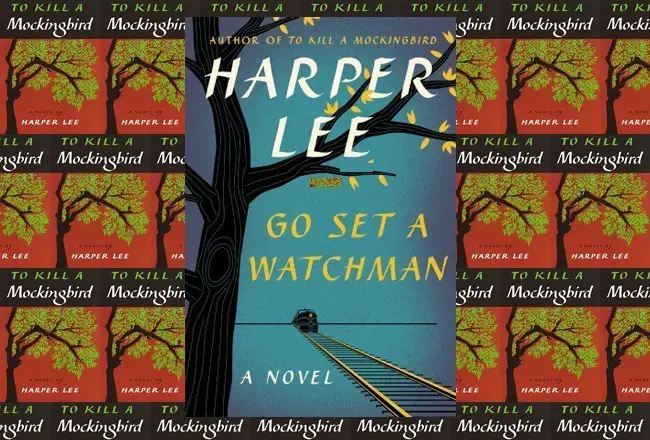
Welcome to part four of FlaglerLive’s live-blogging of “Go Set a Watchman,” the new and controversial novel by Harper Lee. We’ve invited 10 people of varied backgrounds from around the community to read the book and write their response to each of its 19 chapters, from whatever perspective they choose, at whatever length they choose, in 19 installments over the next few weeks.
For a few more details on the project, read the introduction here.
The wild read began Sunday and continues today with reactions to the fourth chapter, which brings back many memories from “Mockingbird,” with a brief history of Maycomb County. That provokes an unusually gentle response from one of Lee’s harshest critics so far (Inna Hardison) while turning our youngest critic, Daniel Masbad, into David Foster Wallace, with bewildering results. If our readers began to discern something more Lee-like than they’ve been used to in the previous three chapters, it’s big sections of the chapter are actually in Mockingbird, too. I personally loved Mary Ann Clark’s summation in today’s edition. It’s a blurb I would love to see on a future edition of “Watchman”‘s dust jacket.
–Pierre Tristam
![]()
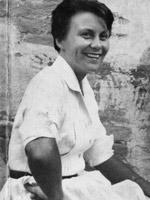
Our Ten Critics: Quick Links
- Today’s Chapter Summary
- Jay Livingston
- Inna Hardison
- Daniel Masbad
- Bill McGuire
- Brian McMillan
- Mary Ann Clark
- Jon Hardison
- Monica Campana
- Darrell Smitty Smith
- Pierre Tristam
![]()
Chapter 4 summary: Lee fills in the 150-year history of Maycomb, platted by drunkards at a tavern and populated since by intermarrying families down to the Cunninghams, the Coningams and the Finches: “The same families married the same families until relationships were hopelessly entangled and the members of the community looked monotonously alike.” World War II veterans gave Maycomb a renaissance of neon signs and brick houses that the narrator disapproves of (“they ruined the old town’s looks”). The boys went so far as naming streets, but “Although Maycomb’s appearance had changed, the same hearts beat in new houses, over Mixmasters, in front of television sets.” The brief history is the chapter’s appetizer to Jean Louise’s date with Henry at a local hotel, where the two talk relationships: Henry’s idea of “how to catch a woman,” and Jean Louise’s rejoinder about how to be caught. “When you get past all the boa feathers, every woman born in this world wants a strong man who knows her like a book, who’s not only her lover but he who keepeth Israel.” Henry nevertheless finds Jean Louise’s version cynical. Jean Louise wonders why he’s waited 15 years to tell her “that you never drink more than half your second cup of coffee after supper[.]”
 Jay Livingston, attorney with Livingston & Sword in Palm Coast: Part II of the book starts with a brief description of Maycomb, Alabama, from its founding to the present. Apparently it came into existence through a mixture of the Governor’s desire for geographic equity and moonshine. It is in the middle of nowhere and probably would not exist but for the fact that it is the county seat. The government makes it special. Back-woods in location but not population and amenities. Yet somehow it is also inbred. Devoid of good roads so bad they were not even worthy of names. The first part of Chapter 4 is a wonderful broad stroke of a southern town in the first half of the 20th century. FDR, and I assume the Works Progress Administration, brought a short stretch of pavement near a school that apparently did nothing but skin knees and ruin recess. Then after WWII the boys returned home as impatient capitalists and rushed the place into a modern town. It is here that we come back to Jean Louise and Henry on a date. The night does not appear to be over when the chapter comes to a close so I think it best to see where the night goes before writing anything further.
Jay Livingston, attorney with Livingston & Sword in Palm Coast: Part II of the book starts with a brief description of Maycomb, Alabama, from its founding to the present. Apparently it came into existence through a mixture of the Governor’s desire for geographic equity and moonshine. It is in the middle of nowhere and probably would not exist but for the fact that it is the county seat. The government makes it special. Back-woods in location but not population and amenities. Yet somehow it is also inbred. Devoid of good roads so bad they were not even worthy of names. The first part of Chapter 4 is a wonderful broad stroke of a southern town in the first half of the 20th century. FDR, and I assume the Works Progress Administration, brought a short stretch of pavement near a school that apparently did nothing but skin knees and ruin recess. Then after WWII the boys returned home as impatient capitalists and rushed the place into a modern town. It is here that we come back to Jean Louise and Henry on a date. The night does not appear to be over when the chapter comes to a close so I think it best to see where the night goes before writing anything further.
 Inna Hardison, co-owner of Ha Media and former publisher of Palm Coast Lifestyles magazine:Truth be told, I was less than enthusiastic about reading this next chapter… The romantic or the sentimentalist in me is generally loathe to see my old pyramids collapse for any reason, and I am pretty sure I want to die loving Scout after all. I surprised myself by liking her here for the first time, truly liking her, if only for a few moments. The chapter is only a few pages long, and I’m sure someone above me will have provided ample play by play on all the things it covers. I tend to ignore plots and such in most things I read and gravitate to the strange, the non-essential. The tiniest of details that touch my humanity are what stands out the most. This chapter allowed me the first glimpses into the old Scout and I’m deliriously happy for those. I now desperately want to know what sort of a game, precisely, Hot-Grease-in-the-Kitchen was and, indeed, who that blue sleeve belonged to.
Inna Hardison, co-owner of Ha Media and former publisher of Palm Coast Lifestyles magazine:Truth be told, I was less than enthusiastic about reading this next chapter… The romantic or the sentimentalist in me is generally loathe to see my old pyramids collapse for any reason, and I am pretty sure I want to die loving Scout after all. I surprised myself by liking her here for the first time, truly liking her, if only for a few moments. The chapter is only a few pages long, and I’m sure someone above me will have provided ample play by play on all the things it covers. I tend to ignore plots and such in most things I read and gravitate to the strange, the non-essential. The tiniest of details that touch my humanity are what stands out the most. This chapter allowed me the first glimpses into the old Scout and I’m deliriously happy for those. I now desperately want to know what sort of a game, precisely, Hot-Grease-in-the-Kitchen was and, indeed, who that blue sleeve belonged to.
And, more importantly, I would imagine, why did Hank wait fifteen years to tell her about that strange second cup of coffee habit?
I could throw the rest of the chapter into the garbage, both the intro with the history of the place and certainly most of the amateur banter on all things Freud and I’d still be pleased as sin to have read the rest of it, pleased to have back just a bit of the cynical and romantic Miss Scout she was supposed to grow up to be.
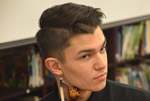 Daniel Masbad, 2015 high school graduate (home-schooled) and concertmaster of the Flagler Youth Orchestra: “Go Set a Watchman” is likely to be a very poor book, and it gives me great displeasure to make such a forecast with fifteen chapters left to weather. The writing in itself is not irredeemable as long as the characters aren’t speaking to each other (I’ve had enough of using the word dialogue). However, if our dear friend does see the need for her characters to discourse, the result could be considered the most precise rendering of inferior acting I have ever read. The issue with that, of course, is I am doubtful such was Lee’s intention. The actual structure of the book, so far as I have read, is slipshod. Each chapter that has gone by feels like a segue into something more important, something at which we never arrive. How many times was it that Vardaman said his mother was a fish? I certainly don’t think it was seventy times seven (fact-checking after the fact yields a greater thrill. Also, tangentially, my thought processes are getting really quite tangled because of the fish and reference to Jesus, I’ll look to fit in loaves of bread later). Watchman might not be a bridge to nowhere, but it is one that doesn’t yet look to be getting us anywhere. These last 48 pages could be condensed into a single paragraph, and not only wouldn’t we be missing anything, but we would have back each of us in our possessions a good deal of precious time (think of your grandchildren).
Daniel Masbad, 2015 high school graduate (home-schooled) and concertmaster of the Flagler Youth Orchestra: “Go Set a Watchman” is likely to be a very poor book, and it gives me great displeasure to make such a forecast with fifteen chapters left to weather. The writing in itself is not irredeemable as long as the characters aren’t speaking to each other (I’ve had enough of using the word dialogue). However, if our dear friend does see the need for her characters to discourse, the result could be considered the most precise rendering of inferior acting I have ever read. The issue with that, of course, is I am doubtful such was Lee’s intention. The actual structure of the book, so far as I have read, is slipshod. Each chapter that has gone by feels like a segue into something more important, something at which we never arrive. How many times was it that Vardaman said his mother was a fish? I certainly don’t think it was seventy times seven (fact-checking after the fact yields a greater thrill. Also, tangentially, my thought processes are getting really quite tangled because of the fish and reference to Jesus, I’ll look to fit in loaves of bread later). Watchman might not be a bridge to nowhere, but it is one that doesn’t yet look to be getting us anywhere. These last 48 pages could be condensed into a single paragraph, and not only wouldn’t we be missing anything, but we would have back each of us in our possessions a good deal of precious time (think of your grandchildren).
Here in Four, we are given some (as of yet) irrelevant and not quite captivating details on the subject of the town of Maycomb. One particularly silly tidbit involves a community inhabited by two families with homophonic surnames, Cunningham and Coningham, who have integrated so thoroughly that the orthographic distinction becomes debate fodder for academia (this is actually historical fact: see Maas, Metzger, Fallopian. Harvard University Press, 1961). Verily, verily (ahem) was it a treat to hear of the resulting confusion and japery! One Cunn-/Coningham was an “uncertain speller,” and, at that, one “given to looking far away sometimes when she sat on her front porch.” Were I an addict in recovery, I would have relapsed at this. Also breathtaking: learning of the history behind the first paved road in Maycomb.
We are then met with intercourse between Jean Louise and Hank, and at the truly jarring mention of a “black hand,” we get an early hint at the likely-to-be-recurring motif of race relations (oooh, aaah). The impression I get is that Jean Louise is a spineless phony. It could be derived from her manner of speaking that she (or Harper Lee) would very much like for us to believe that she is tough and street-wise. Actuality seems rather to point to fanciful. Scout Finch, juvenile desperado, hellraiser extraordinary, yuppy magna et profunda. Her critique of “sleek, Madison Avenuey young marrieds” is almost childish to my ears (eyes), akin to the classic, “That [object of my envy that you, my peer, possess] is stupid!” But perhaps, in Lee’s mind, Jean Louise is as Jean Louise would like for us to think, and it’s merely Lee’s writing that fails to accurately convey this. Not to say that to do it successfully would be any feat equal to walking on water (ba-dum ching [I gave up on the bread {or infinitely resigned, one could say}]). In any case, more important than any of this, I think, is my mental stability. Current projection is that I’ll be needing an analyst by Chapter Ten.
Update: Met with an analyst. E (gender-fluid analyst, prefers Spivak pronouns) suggests I apologize to those who may have been affected by any hostile language or sarcasm of mine, past and future. This is my effort to that effect.
P. S. By “analyst” I do not mean Other Woman.
P. P. S. Speaking of psychoanalysis, we are given some adroit guidance by our beloved Jean Louise on “how to catch a woman . . .” I paraphrase: “Be her father.”
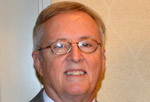 Bill McGuire, Palm Coast City Councilman and management consultant: I’m feeling less negative and cynical about this novel after reading chapter 4. Harper Lee’s editor should be horsewhipped – this chapter sets the background and setting for this novel and does so in an interesting manner. It should have been the beginning of the novel. Personally, I find that the origin of small towns and rural areas to be a fascinating subject, especially when a town can trace its roots back to early days in American history. Chapter 4 brings back memories from “Chiefs,” by Stuart Woods and “Fried Green Tomatoes at the Whistle Stop Café,” by Fannie Flagg. The machinations of the town fathers and noteworthy citizens of the community I find to be interesting. Chapter 4 has rendered the first 43 pages of this novel worthless, in my opinion. The writing style as well as the conversation seems much less contrived and stilted than in the beginning of this novel. But I digress. A conversation between Jean Louise and Henry is the beginning of a plot matching the pseudo-sophistication of a New Yorker returning to her Alabama roots and a self-made man in the town in which they were raised. Now I am interested to see if their personalities are compatible and if there is any future for them. The end of the chapter features the two of them heading for a favorite waterplace. And, I’m sure, the next chapter will chronicle their adventures while ostensibly skinny-dipping (okay, I glanced ahead to see.)
Bill McGuire, Palm Coast City Councilman and management consultant: I’m feeling less negative and cynical about this novel after reading chapter 4. Harper Lee’s editor should be horsewhipped – this chapter sets the background and setting for this novel and does so in an interesting manner. It should have been the beginning of the novel. Personally, I find that the origin of small towns and rural areas to be a fascinating subject, especially when a town can trace its roots back to early days in American history. Chapter 4 brings back memories from “Chiefs,” by Stuart Woods and “Fried Green Tomatoes at the Whistle Stop Café,” by Fannie Flagg. The machinations of the town fathers and noteworthy citizens of the community I find to be interesting. Chapter 4 has rendered the first 43 pages of this novel worthless, in my opinion. The writing style as well as the conversation seems much less contrived and stilted than in the beginning of this novel. But I digress. A conversation between Jean Louise and Henry is the beginning of a plot matching the pseudo-sophistication of a New Yorker returning to her Alabama roots and a self-made man in the town in which they were raised. Now I am interested to see if their personalities are compatible and if there is any future for them. The end of the chapter features the two of them heading for a favorite waterplace. And, I’m sure, the next chapter will chronicle their adventures while ostensibly skinny-dipping (okay, I glanced ahead to see.)
 Brian McMillan, columnist and executive editor of the Palm Coast Observer:Before I comment on chapter 4, I’d like to take a moment to meta-blog.
Brian McMillan, columnist and executive editor of the Palm Coast Observer:Before I comment on chapter 4, I’d like to take a moment to meta-blog.
As I’ve read the blog posts from the other readers, I have been impressed by the thoughtfulness of everyone’s observations. I’m not patronizing when I say that your way with words and your overall intelligence are impressive and even intimidating at times.
I’ve also noticed that, my posts included, many of the observations have focused on the failures of the novel so far. We seem to have reached a consensus that this is not a very well-written novel, and we have ample evidence to back that up.
But something is troubling me. As Pierre put it, the publication of this novel could be considered literary rape: Harper Lee likely had no intention of the novel ever coming to life, and yet others are now profiting by her dementia and publishing it anyway. For that reason, I can sympathize with the people who are boycotting the novel to honor Lee’s memory, and to honor the canonized “Mockingbird.”
By participating in this blog and encouraging others to follow along, however, I have decided not to boycott the novel. Still, I feel that Harper Lee deserves my respect for what she has contributed to American letters. And so, rather than taking every opportunity to criticize the flaws of this story, which is apparently a draft and not a polished masterpiece, I will focus my future efforts on what I can discern as Lee’s storytelling intentions in “Watchman.” After all, I wouldn’t want to judge Michelangelo as an artist based on the merits of his hand-drawn, discarded figure studies. Rather, I would study the discarded drawings, searching for insights into his creative process.
Chapter 4: Two small things stood out to me in chapter 4. First was Jean Louise’s statement to Henry, “I’m so afraid of making a mess of being married to the wrong man — the wrong kind for me, I mean.” I remember when I was an undergraduate at college and going on a lot of chaste dates (Brigham Young University was a lot like the Harper Lee 1950s in that respect), wondering whom I would marry. I used to joke with my friends that I wasn’t going to get married until I was 32, just because I was afraid of marrying someone and then falling out of love with her.
Fortunately, for me, my marriage and my family life have been wonderful. But I talk with my wife Hailey occasionally about how lucky we are that neither of us turned out to be a psychopath. Because no matter how long you date the person (and we didn’t date very long), you still don’t know if a year later they could let their true personality show and actually be cruel or messed up in one way or another.
So, Jean Louise’s fear I think accounts for a lot of her ostentatious personality. She is putting on a show to protect herself from committing to a person. She is young and doesn’t want to take risks, so she jokes and insults instead.
The second moment that stood out to me was how she reacts to this observation of Henry’s: “You never drink more than half your second cup of coffee after supper.” Jean Louise is “surprised” and then “shy” at the thought that Henry has paid so much attention that he noticed such a small thing about her personality.
One of the main threads in the novel so far is Jean Louise’s relationship with Henry, and this could be a major moment. It feels actually like the first true moment of her heart genuinely falling in love with him. It’s a sweet moment, and I feel true to life. Because when you’re in love, these kinds of small things do matter.
The moment also has a complicated side to it, however, and that’s the fact that it’s still inward-pointing. Jean Louise is falling more in love with Henry why? Because he is paying attention to her in excruciating detail, and that pleases her. Her self-centeredness is being excused and rewarded by his adoration. Is this more like worship than love? In her immaturity, does Jean Louise know the difference?
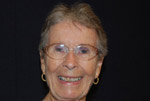 Mary Ann Clark, founder of Flagler Reads Together and president of the Flagler County Historical Society: Maycomb is not a very interesting town, nor is Jean Louise’s philosophy of love and marriage.
Mary Ann Clark, founder of Flagler Reads Together and president of the Flagler County Historical Society: Maycomb is not a very interesting town, nor is Jean Louise’s philosophy of love and marriage.
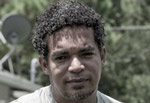 Jon Hardison, co-owner of Ha Media in Palm Coast and member of the FlaglerLive board of directors:I Wish this book would get going already. It’s almost as if the author knew the pressure was off when she pieced it together, and is dragging her feet to see how long she can get away with it. Ah, but we know that’s not the case. Don’t we? In this chapter a more relaxed Jean Louise lights up a smoke and lets a little New York cynicism spill. I think I’m supposed to be interested now – more curious, I’m still not when, at the end, Jean Louise’s Uncle Jack makes and appearance. I’m growing concerned that it could just be me.
Jon Hardison, co-owner of Ha Media in Palm Coast and member of the FlaglerLive board of directors:I Wish this book would get going already. It’s almost as if the author knew the pressure was off when she pieced it together, and is dragging her feet to see how long she can get away with it. Ah, but we know that’s not the case. Don’t we? In this chapter a more relaxed Jean Louise lights up a smoke and lets a little New York cynicism spill. I think I’m supposed to be interested now – more curious, I’m still not when, at the end, Jean Louise’s Uncle Jack makes and appearance. I’m growing concerned that it could just be me.
 Monica Campana, just-retired head librarian at Indian Trails Middle School and free-speech advocate: Maycomb: a lovely, small southern town and a wonderful place to raise your children, if you are the right color and related to the right people. Lee takes us through the history of a town that she obviously loves and hates with a dry, cynical humor that engages us. I cackled when the principal proclaimed that the children no longer could play pop the whip on the FDR-constructed pavement due to skinned knees and cracked crania and, “thus the seeds of states’ rights were sown in the hearts of Jean Louise’s generation.” Lee has the ability to explain how ingrained their independence (and racism) is with southern charm. It’s almost like swallowing sickeningly sweet cough syrup. The dialogue improves, too—Henry and Jean Louise engage in a less stilted and more believable conversation at the end of the chapter. Makes me wish Lee had written more.
Monica Campana, just-retired head librarian at Indian Trails Middle School and free-speech advocate: Maycomb: a lovely, small southern town and a wonderful place to raise your children, if you are the right color and related to the right people. Lee takes us through the history of a town that she obviously loves and hates with a dry, cynical humor that engages us. I cackled when the principal proclaimed that the children no longer could play pop the whip on the FDR-constructed pavement due to skinned knees and cracked crania and, “thus the seeds of states’ rights were sown in the hearts of Jean Louise’s generation.” Lee has the ability to explain how ingrained their independence (and racism) is with southern charm. It’s almost like swallowing sickeningly sweet cough syrup. The dialogue improves, too—Henry and Jean Louise engage in a less stilted and more believable conversation at the end of the chapter. Makes me wish Lee had written more.
 Darrell Smitty Smith, Flagler Beach AC technician, FlaglerLive contributor and George Carlin reincarnation: Part Two, Chapter Four, and I guess that means I’ve only reached the Second Circle of Hell. Or maybe the Third. Pleeease let it be the Third. I mean Hotgreaseinthekit-chen? All I can think of is I will promise to go in that kitchen and go bobbing for French Fries if you don’t make me read any more of this boring-assed-nothing-ever-happens-book. Pierre, you knew this was coming you sadistic bastard you. You must have had an Uncle in the Mukhabarat or something that taught you torture this cruel. Instead of continuing to bitch and moan about the failures of plot, language or the downright stubborn refusal to give the reader one thing to give a shit about on display so far, I think this might be a time to discuss the persistent rumors that have evidently been floating in literary circles for years, but are coming to the fore now that this abomination has been shat at us. More soon.
Darrell Smitty Smith, Flagler Beach AC technician, FlaglerLive contributor and George Carlin reincarnation: Part Two, Chapter Four, and I guess that means I’ve only reached the Second Circle of Hell. Or maybe the Third. Pleeease let it be the Third. I mean Hotgreaseinthekit-chen? All I can think of is I will promise to go in that kitchen and go bobbing for French Fries if you don’t make me read any more of this boring-assed-nothing-ever-happens-book. Pierre, you knew this was coming you sadistic bastard you. You must have had an Uncle in the Mukhabarat or something that taught you torture this cruel. Instead of continuing to bitch and moan about the failures of plot, language or the downright stubborn refusal to give the reader one thing to give a shit about on display so far, I think this might be a time to discuss the persistent rumors that have evidently been floating in literary circles for years, but are coming to the fore now that this abomination has been shat at us. More soon.
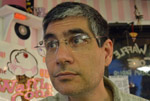 Pierre Tristam, editor of FlaglerLive: At first I wasn’t sure sure what to make of this chapter, which starts with a brief history of Maycomb and ends with a digest of Jean Louise’s date with Henry. The writing is a little more polished, a little more clever than cute if still judgmental and out of sync with the narrator’s disposition so far (Maycomb’s World War Two vets returned “with bizarre ideas about making money,” the narrator tells us, though what, one wonders, was at least part of Jean Louise’s motivation to self-exile to New York City, where few people choose to go to be poor?).
Pierre Tristam, editor of FlaglerLive: At first I wasn’t sure sure what to make of this chapter, which starts with a brief history of Maycomb and ends with a digest of Jean Louise’s date with Henry. The writing is a little more polished, a little more clever than cute if still judgmental and out of sync with the narrator’s disposition so far (Maycomb’s World War Two vets returned “with bizarre ideas about making money,” the narrator tells us, though what, one wonders, was at least part of Jean Louise’s motivation to self-exile to New York City, where few people choose to go to be poor?).
Then it hit me. There are whole segments of the Maycomb part in this chapter that are lifted word for word from, or into, “Mockingbird”’s 13th chapter (mostly), the one where Alexandra the Hun moves in. Turns out the previous chapter was cribbed too: “let any moral come along and she would uphold it; she was a disapprover; she was an incurable gossip,” is all but for the disapprover clause in Mockingbird 13 (might as well start referring to it like gospel in light of “Watchman”’s increasing apocryphal status). So is the entire bit about Sinkfield the tavern keeper, the entire first couple of pages, Maycomb’s “primary reason for existence” being government and the bit about families intermarrying. It’s not a lost cause: Some of the changes give us tantalizing insights into the editing process. What in Watchman was “The same families married the same families until relationships were hopelessly entangled and the members of the community looked monotonously alike” became, in the more sparingly elegant Mockingbird version, “the same families married the same families until the members of the community looked faintly alike.” Notice too how the Mockinbird version picks up rhythm where the Watchman version is still clunking along on that train the novel came in.
So if we didn’t need more proof that Watchman was really a draft, this seems to settles the case. It also explains the numerous problems of construction in Watchman, which has clearly been eviscerated. The brief history of Maycomb in Watchman is mildly instructive but out of place in the sequence of the novel so far and in the chapter. The chapter is split between the socio-historical lesson and that date at a local restaurant, which has no relevance to the history just outlined or the scene at hand, other than that it’s not Atticus’s house. I’m trying to figure out how the history and the date are related. I’m not seeing more than Lee’s scotch tape. None of that sort of cobbling damaged “Mockingbird,” where each chapter’s construction was at least as interesting as its substance, the weave of Lee’s numerous stories within stories creating that fabric we remember so well, and remember so often more than its much clunkier and off-putting details. Lee placed this same history of Maycomb in Chapter 13, almost halfway through the novel, because it accompanied Alexandra’s reentry into the Finch household, and the Maycomb history, as Lee shaped it, was directly relevant to Alexandra’s twisted ideas about “good breeding,” which form the terrific part at the end of Mockingbird 13, when Atticus, acting on Alexandra’s orders, finds himself trying to explain to his children how they must behave in accordance with their “gentle breeding,” only to realize what revolting idiocy he’s putting his children through. The mere construction of Lee’s chapters in Mockingbird was like a subplot, suggesting and anticipating what’s to come.
In Watchman, the Maycomb bit leads to nothing. There is no inventive construction or storytelling drive to hang our wonders on. It leaves bare the words spoken. That conversation between Henry and Jean Louise about what women like sounds as condescending and out of place, as dated and distasteful, as Jem’s and Jean Louise’s presumptions toward Calpurnia in some places in Mockingbird, only the subject matter here is more banal. At least in “Mockingbird” the children are still in the infancy of their awareness of race’s minefield. Here we’re dealing with two adults. But how can we blame Lee when it becomes more apparent with every page that she must have realized the weaknesses of Watchman had earned it a permanent place in her safe-deposit box? Lee isn’t to blame: her current editor and lawyer are, and I’m learning to read this book as either a way to actually better appreciate Mockingbird or as a creation distinct even from Lee, since she didn’t want it published. It’s a marketer’s creation.
That said, Jean Louise, aside from her jaundiced summation of New York relationships, still manages to come off sounding like a Cosmo cutout, agreeing to Henry’s claim that a woman “wants a father instead of a husband.” How un-Scout. Henry is just a foil, not a character. He’s sidekick to Jean Louise-Lee’s one-liners, though he seems to have noticed for years that Jean Louise never finishes her second cup of coffee. We are left to believe that it is an insight of Pascal-wager-caliber, while Jean Louise is left asking the equally profound question: “Why had he waited fifteen years to tell her?”
Tell me we’ve not waited 70 years to hear the answer to that question.





























Oldseadog says
A great article by Dale Russakoff about Mary Badman (who played Scout in the movie
“To Kill a Mockingbird”)
in the New Yorker Magazine on July 17 2015 is found in the link below:
http://www.newyorker.com/books/page-turner/the-atticus-we-always-knew